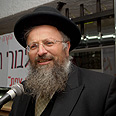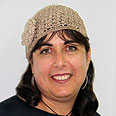

The poll was conducted by the Panels research institute among 502 respondents, who comprise a representative sample of the adult Jewish population in Jewish communities in the State of Israel. The maximal sampling error was 4.4%.
Seventy-three percent said a rabbi who receives his salary from the State must not voice a controversial political opinion, while 23% said that as public leaders they should express their opinion on any matter. The rest of the respondents did not answer the question.
A segmentation according to religious affiliation revealed that secular (91%) and traditional (66%) Israelis believe rabbis who are civil servants must not voice their opinions on such matters, while the religious (75%) and haredim (72%) object to any restriction on rabbis' freedom of speech.
Following the rising tensions between religious and secular Jews in Israel following the controversial letter, the survey's' respondents were asked what the rabbis should do in order to reduce resistance.
Fifty-five percent called on them to practice tolerance towards the other, 22% expect them to honor human rights, 15% believe the problem stems from a lack of understanding of media and public relations, and 8% said the rabbis should not seek to reduce the level of hostility towards them.
Secular (61%) and traditional (63%) Jews are convinced that the problem stems from the rabbis' intolerance towards those who are different, the religious (49%) blame bad PR, and the haredim (44%) see no need to bring rabbis and seculars closer.
Rabbis prevent unfounded hatred?
The respondents were also asked to what extent were the rabbis trying to prevent a dispute within the nation.
Fifty-seven percent said "not at all" or "slightly", 19% said "quite a lot" or "very much", and 18% said "so so". The rest had no opinion on the matter.
An analysis of the results revealed that the secular (70%) and traditional (54%) publics believe the rabbis have failed in this area, while the religious (57%) and haredim (61%) are satisfied with their conduct.
Yesodot's educational director, Shoshi Becker, said "the findings illustrate the polarization between religious and secular. Those who care about the rabbinical world must pay attention to the responses of the majority of the public in Israel, which believes that this is not just a problem of communication.
"If the rabbinical world doesn’t come to its senses, the many seculars' desire that it won't be funded by the State may materialize. Tolerance is a necessary condition for fixing the dispute and restoring the Rabbinate's status in the eyes of the entire public."
- Follow Ynetnews on Facebook















